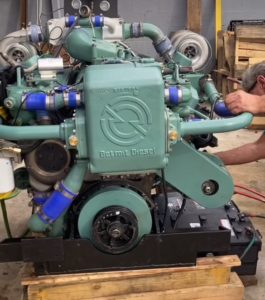December 9, 2024
Guidelines for Disassembly, Cleaning, and Inspection For 92 Series Engines (6V92 , 8V92, 12V92, 16V92)
1. Preparation for Disassembly
Clean the Exterior
Gather Necessary Tools and Documentation
1. Use Detroit Diesel-Approved Tools
2. Substitute the Manual with Verified Specifications
3. Supplementary Resources
4. Final Tips for Preparation
Drain Fluids
3. Disassembly Process
3. Cleaning and Inspection
Replacement of Key Components: Pistons, Liners, Bearings
1. Pistons
2. Cylinder Liners
3. Bearings
Overhaul Kits For Detroit Diesel 92 Series
Reassembly Tips
Follow Manufacturer Specifications
Cylinder Head Bolts
Main Bearing Cap Bolts
Connecting Rod Bolts
Injector Hold-Down Bolts
Exhaust Manifold Bolts
Flywheel Bolts
Thermostat Housing Bolts
Valve Clearance (Cold)
Injector Timing Plunger Travel
Piston-to-Cylinder Wall Clearance
Main Bearing Clearance
Connecting Rod Bearing Clearance
Step-by-Step Assembly Sequence
Lubricate Moving Parts
Test Fit Components
Conclusion
Read More
December 9, 2024
Preparing the Engine for Long-Term Storage
Perform Initial Maintenance
Clean the Engine
Preserve the Fuel System
Preserve the Cylinders
Seal Openings
Disconnect the Battery
Store the Engine in a Controlled Environment
Restoring an Engine from Storage
Perform a Visual Inspection
Drain and Replace Fluids
Reconnect the Battery
Prime the Fuel System
Rotate the Crankshaft
Start the Engine
Perform a Test Run
Inspect for Leaks
Best Practices for Storage and Restoration
Documentation
Periodic Checks During Storage
Use Manufacturer-Approved Products
Restore Gradually
Conclusion
Read More
December 9, 2024
1. General Adjustment Procedures
2. Exhaust Valve Clearance Adjustment
3. Fuel Injector Timing Adjustment
4. Best Practices for Adjustments
5. Maintenance Interval
1. Mechanical Governors
2. Electronic Governors (DDEC Systems)
3. Maintenance and Troubleshooting
4. Application-Specific Considerations
Read More
December 9, 2024
Key Maintenance Items and Replacement Intervals
Maintenance Task
Interval
Details
Marine Applications: Specific Maintenance Requirements
1. Corrosion Prevention
Raw Water Cooling Components For 92 Series Engines:
2. Exhaust System Maintenance
3. Lubrication System Adaptations
4. Fuel System Adaptations
5. Cooling System Maintenance
6. Load Management
7. Emergency Systems
Conclusion
Read More
December 9, 2024
1. Mechanical Governors
Key Components of Mechanical Governors
Adjustment Procedure for Mechanical Governors
Preparation
Idle Speed Adjustment
Maximum Speed Adjustment
Verify Settings
Additional Tips
2. Electronic Governors (DDEC Systems)
Key Components of Electronic Governors
Offers programmable features for custom speed settings, diagnostic functions, and fault detection.
Adjustment Procedure for Electronic Governors
5. Test and Verify
Advantages of DDEC Electronic Governors
3. Maintenance and Troubleshooting
Mechanical Governors
1. Inspect Components
2. Lubricate Moving Parts
Tools Needed:
3. Monitor Speed Stability
Best Practices for Mechanical Governor Maintenance
Electronic Governors (DDEC Systems)
Inspect Wiring and Connections
Wire crimping and stripping tools for repairs or replacements.
Update Software
Best Practices for Maintaining Electronic Governors
4. Application-Specific Considerations
On-Highway Applications
Marine Applications
Industrial Applications
Best Practices for Application-Specific Settings
Conclusion
Read More

December 6, 2024
1. General Adjustment Procedures
1. Ensure the Engine is at Normal Operating Temperature
2. Disconnect Battery Connections
3. Gather Required Tools
4. Position the Engine at the Correct TDC
2. Exhaust Valve Clearance Adjustment
Step 1: Locate TDC for Adjustment
Step 2: Loosen the Lock Nut
Step 3: Insert the Feeler Gauge
Step 4: Adjust the Clearance
Step 5: Tighten the Lock Nut
Step 6: Verify the Clearance
Additional Tips:
3. Fuel Injector Timing Adjustment
Step 1: Set the Engine at TDC
Step 2: Position the Injector Rack
Step 3: Adjust the Timing Plunger
Step 4: Lock the Adjustment
Step 5: Test Injector Operation
Additional Tips for Fuel Injector Timing
Importance of Accurate Timing
4. Best Practices for Adjustments
Adjust Sequentially
Double-Check Measurements
Inspect for Wear
Tighten Fasteners to Torque Specifications
5. Maintenance Intervals
Standard Interval
Severe Conditions
Additional Maintenance Tips
6. Additional Tips from the Detroit Diesel 92 Series Manual
1. Use Genuine Specifications
2. Monitor Engine Performance
3. Keep Records
Clarifications and Notes
7. Conclusion
Read More





 Free US Calls: 1-888-433-4735
Free US Calls: 1-888-433-4735 International: 305-545-5588
International: 305-545-5588


